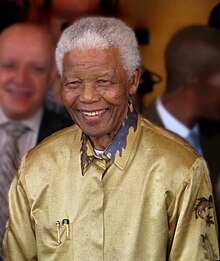George Walker Bush (born July 6, 1946) is an American politician who served as the 43rd President of the United States from 2001 to 2009 and 46th Governor of Texas from 1995 to 2000. The eldest son of Barbara and George H. W. Bush, he was born in New Haven, Connecticut. After graduating from Yale University in 1968 and Harvard Business School in 1975, he worked in oil businesses. He married Laura Welch in 1977 and ran unsuccessfully for the House of Representatives shortly thereafter. He later co-owned the Texas Rangers baseball team before defeating Ann Richards in the 1994 Texas gubernatorial election. He was elected president in 2000 after a close and controversial election against Al Gore, becoming the fourth president to be elected while receiving fewer popular votes nationwide than an opponent.[6] He is the second president to have been the son of a former president, the first having been John Quincy Adams.[7] He is also the brother of Jeb Bush, a former Governor of Florida and former candidate for the Republican presidential nomination in the 2016 presidential election.
Eight months into Bush's first term as president, the September 11 terrorist attacks occurred. Bush responded with what became known as the Bush Doctrine: launching a "War on Terror", an international military campaign which included the war in Afghanistan, in 2001, and the Iraq War, in 2003. He also promoted policies on the economy, health care, education, social security reform, and amending the Constitution to prohibit same-sex marriage.[8] He signed into law broad tax cuts, the Patriot Act, the No Child Left Behind Act, the Partial-Birth Abortion Ban Act, Medicare prescription drug benefits for seniors, and funding for the AIDS relief program known as PEPFAR. His tenure saw national debates on immigration, Social Security, electronic surveillance, and torture.
Bush successfully ran for re-election against Democratic Senator John Kerry in 2004, in another relatively close election. After his re-election, Bush received increasingly heated criticism from across the political spectrum[9][10][11] for his handling of the Iraq War, Hurricane Katrina,[12][13][14] and other challenges. Amid this criticism, the Democratic Party regained control of Congress in the 2006 elections. In December 2007, the United States entered its longest post-World War II recession, often referred to as the "Great Recession", prompting the Bush administration to obtain congressional passage of multiple economic programs intended to preserve the country's financial system. Nationally, Bush was both one of the most popular and unpopular presidents in history, having received the highest recorded presidential approval ratings in the wake of the September 11 attacks, as well as one of the lowest approval ratings during the 2008 financial crisis.[15] He was met with public protests during visits to the United Kingdom.[16]
Bush left office in 2009, returning to Texas where he purchased a home in suburban Dallas. He is currently a public speaker, and has written a memoir, Decision Points.[17] His presidential library was opened in 2013. His presidency has been ranked among the worst in surveys of presidential scholars published in the late 2000s and 2010s.[18][19][20]
Eight months into Bush's first term as president, the September 11 terrorist attacks occurred. Bush responded with what became known as the Bush Doctrine: launching a "War on Terror", an international military campaign which included the war in Afghanistan, in 2001, and the Iraq War, in 2003. He also promoted policies on the economy, health care, education, social security reform, and amending the Constitution to prohibit same-sex marriage.[8] He signed into law broad tax cuts, the Patriot Act, the No Child Left Behind Act, the Partial-Birth Abortion Ban Act, Medicare prescription drug benefits for seniors, and funding for the AIDS relief program known as PEPFAR. His tenure saw national debates on immigration, Social Security, electronic surveillance, and torture.
Bush successfully ran for re-election against Democratic Senator John Kerry in 2004, in another relatively close election. After his re-election, Bush received increasingly heated criticism from across the political spectrum[9][10][11] for his handling of the Iraq War, Hurricane Katrina,[12][13][14] and other challenges. Amid this criticism, the Democratic Party regained control of Congress in the 2006 elections. In December 2007, the United States entered its longest post-World War II recession, often referred to as the "Great Recession", prompting the Bush administration to obtain congressional passage of multiple economic programs intended to preserve the country's financial system. Nationally, Bush was both one of the most popular and unpopular presidents in history, having received the highest recorded presidential approval ratings in the wake of the September 11 attacks, as well as one of the lowest approval ratings during the 2008 financial crisis.[15] He was met with public protests during visits to the United Kingdom.[16]
Bush left office in 2009, returning to Texas where he purchased a home in suburban Dallas. He is currently a public speaker, and has written a memoir, Decision Points.[17] His presidential library was opened in 2013. His presidency has been ranked among the worst in surveys of presidential scholars published in the late 2000s and 2010s.[18][19][20]






.jpg)
